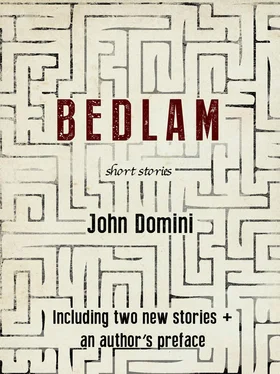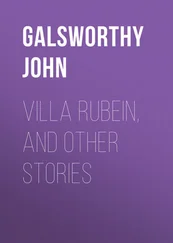So I began to inspect my charges, one by one. Never had I been so close to them. I touched their faces, gazed deep into their reflecting eyes, stroked them frankly, boldly spoke to them. They will be here forever, but they have not been here forever: that thought sustained me. I resolved that, on the untold day when I exhausted their number, I would start again.
In the course of my searching, I discovered the man who had once, so long ago, passed through this inferno unharmed.
He was among the Wrathful. Who can understand? Perhaps he had neglected to control his powers, and his poetry — for even in my present solitude I had heard the news that he was a poet — had not done the job it was given; instead of describing a pilgrim’s journey, in the middle of life’s road, down through the circles of torment in this world, back again through Purgatory, attaining at last to beatific Grace, his poetry perhaps had merely trumpeted himself and his petty angers. Having set out to demonstrate eternal values, he instead revealed himself. Or perhaps the Powers had planned it this way from the first, that would be like Them. No man may just visit; he must return to stay. Or maybe the poet with the formidable nose was actually Miplip, Miplip, still a demon, still torturing others with visions of alternatives, of there existing something else, something more . Miplip — more? More than we have? More than we see? But Miplip was gone, after all. It was unreasonable, very strange, that I should worry so much about him when he was gone.
Whoever he was, this man conversed with me.
We exchanged ideas by means of pantomime. Apparently he was very excited about being given the chance to try. He had jostled his way to the front of the line I was examining, and as his hands and arms flew about he grinned, whenever his mouth was not being called upon to aid expression. Each statement was made with a huge energy, a silent, ambidextrous outburst of human feeling that strove always for the most accurate effects, the thing closest to true speech. He succeeded in getting across a great deal, more than I would have thought possible. He said they had gotten accustomed to pain, just as Miplip had suspected. The reminders of earth were very depressing, he said, as we had hoped they would be, but after a while this sorrow, too, had faded, and the damned had come to look forward to our shows, as refreshing variations in the routine.
He then said that their fondest wish at present was to begin, somehow, communicating with us, because they had developed a great fondness, a great sympathy, for their keepers. A devil’s existence is predicated on torture, he said. Since it is impossible to torture anyone forever, we were now condemned to what was originally intended for them: a life without hope.
After that his thoughts moved beyond the range of mime. But I lingered there before him, enjoying his mute philosophy. Others in the area watched us, or else began again their aimless, milling search for something besides the routine. I had no more regard for them than I had for how time was passing, as I watched this man struggling to make his points. Nor did I care how that damned deluder Miplip might be using the time — always his greatest ally — to slip further away. The poet seemed to be saying that the problem of hope (hands clasped over heart, raised to forehead, then opened upwards and raised to roof) and the problem of speech (mouth opening and closing while left hand, palm up, moves from lower lip out towards listener and back) were one and the same, and that neither hope nor speech had very much to do, in the final analysis, with pain (face in a grimace, left hand in a fist and jabbing chest repeatedly, in the vicinity of the heart).
This last sight seemed to penetrate me, actually enter and pass through, like that man or any other who had passed through Hell and been reborn, leaving in the wake of its emotion a vacuum that could no longer be filled by mere looking. I had to touch. Moved, startled beyond even the constant abjurations my conscience had made against physical contact since the disappearance of Miplip, I reached out and took hold of his fist as it once more struck his chest. With his free hand he covered mine. All at once there was speech, real speech, in a voice that had been consumed twice over, once by agony and once by the implacable need of forgiveness:
“Don’t let go, please, please, don’t let go,” Miplip said. “Oh lover, please.”
Special Instructions, Special Instructions
It was an ordinary urban incident at first, the sort of thing you get accustomed to sooner or later, here or in any other city. One morning I was walking from my apartment to the bank, along the one-ways on the Charles River side of Massachusetts Avenue. It was spring then. I’d been up early, 6:15, hearing the radio report the day’s weather with what sounded like a smile in its voice, and that made a fine start. The alarm was set so early because Priss had set it, not the night before but the night before that, so we could get up in time to make love before we had to go to work. She wasn’t ordinary about love. Most people don’t like to have it early in the morning. But according to Priss, it was much better then than late at night, when, again according to her, you were tired, achey, cold, insensible, numb. I had the house to myself this particular morning, though; Priss wasn’t there. And actually that added to the pleasant flavor of events. Because while I never said no to Priss — I didn’t like to say no to Priss — it could be nerve-wracking and hard on the body to erupt out of sleep so abruptly, so incontrovertibly. I spent another hour-and-a-half in bed after the weather forecast. I ate breakfast on the porch, in the sun. I decided then to walk to the bank rather than drive. So it was on a small street lined with trellises and flower boxes, just this side of the Square, that an old woman standing in the doorway of a wooden triple-decker called to me.
“Have you seen my children?” she said, or at least that’s the way I heard it. “They’re right here most of the time and now they’re not. No, they’re not. They’re usually playing right here in front of me and I’m so frightened now. I haven’t seen them all day . I’m so frightened, so frightened now.”
She was an old woman. She wore a decent gray wool dress with thin red lines in squares. Her face and hair and fingers were all finely kept, very clean. The house in whose doorway she stood wasn’t nearly as cheerless and dilapidated as some of these places. The paint was recent, the front step intact. But she had awfully thin arms and legs, where they showed, where the gray dress stopped. I guessed she felt the cold more than most. It was too warm out for wool otherwise. I asked how old her children were.
“They aren’t my children. Oh. I didn’t mean to give you that impression. I apologize if that’s what you thought.”
She spoke without smiling, her head planted on her neck and her entire thin body still. One hand was on the door jamb, the other on the inside knob of the open door. Only her eyes moved, constantly scanning the street, meeting mine on every fifth word, or possibly every sixth.
“They are little children who play here right in front and over on the other side of the street. All day long they play. I’m an old woman and I live alone and I’m so frightened. I’m so frightened all the time.”
I can’t say just when I began to get my idea. As I mentioned before, you get accustomed to this sort of thing. But you never get so accustomed you lose all sympathy, certainly not. In any event I spoke up. I concentrated on sounding formal, because of the strength in sounding formal. The woman needed a friendly touch but also she needed the boost of real muscle. I tried to catch those wandering eyes.
Читать дальше












